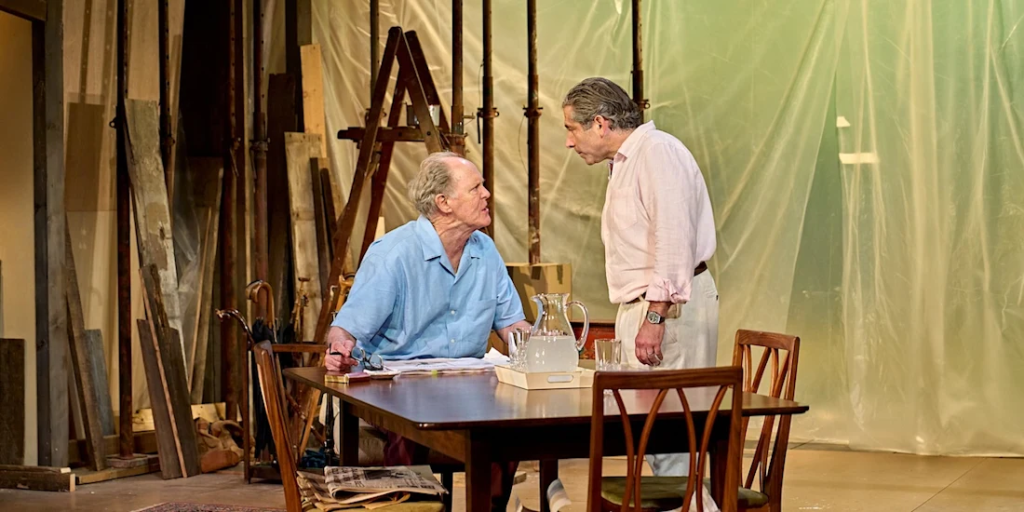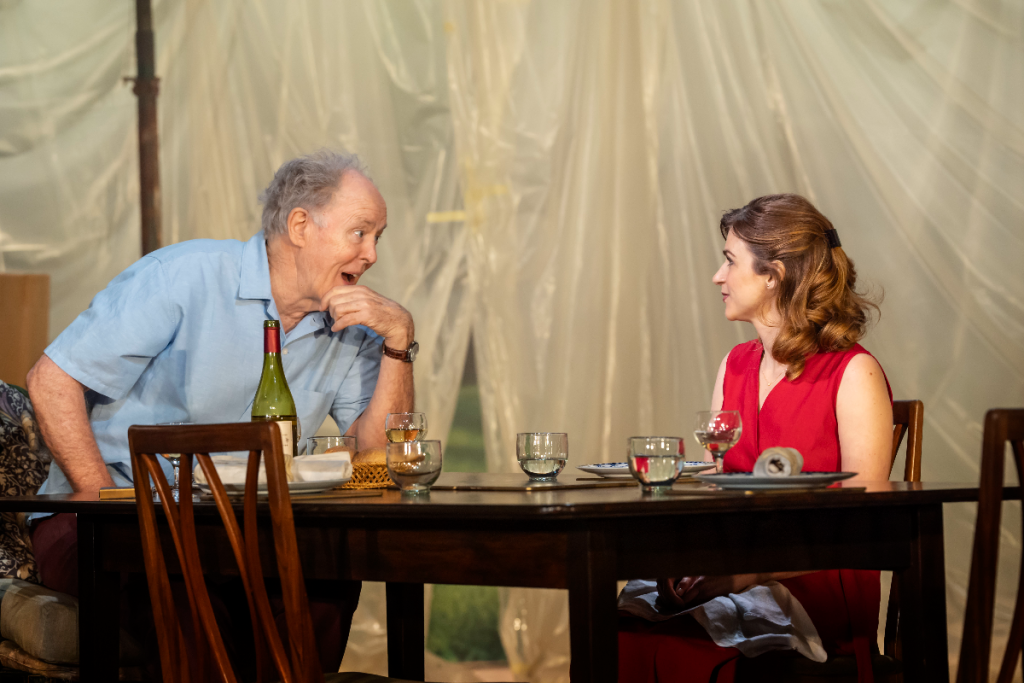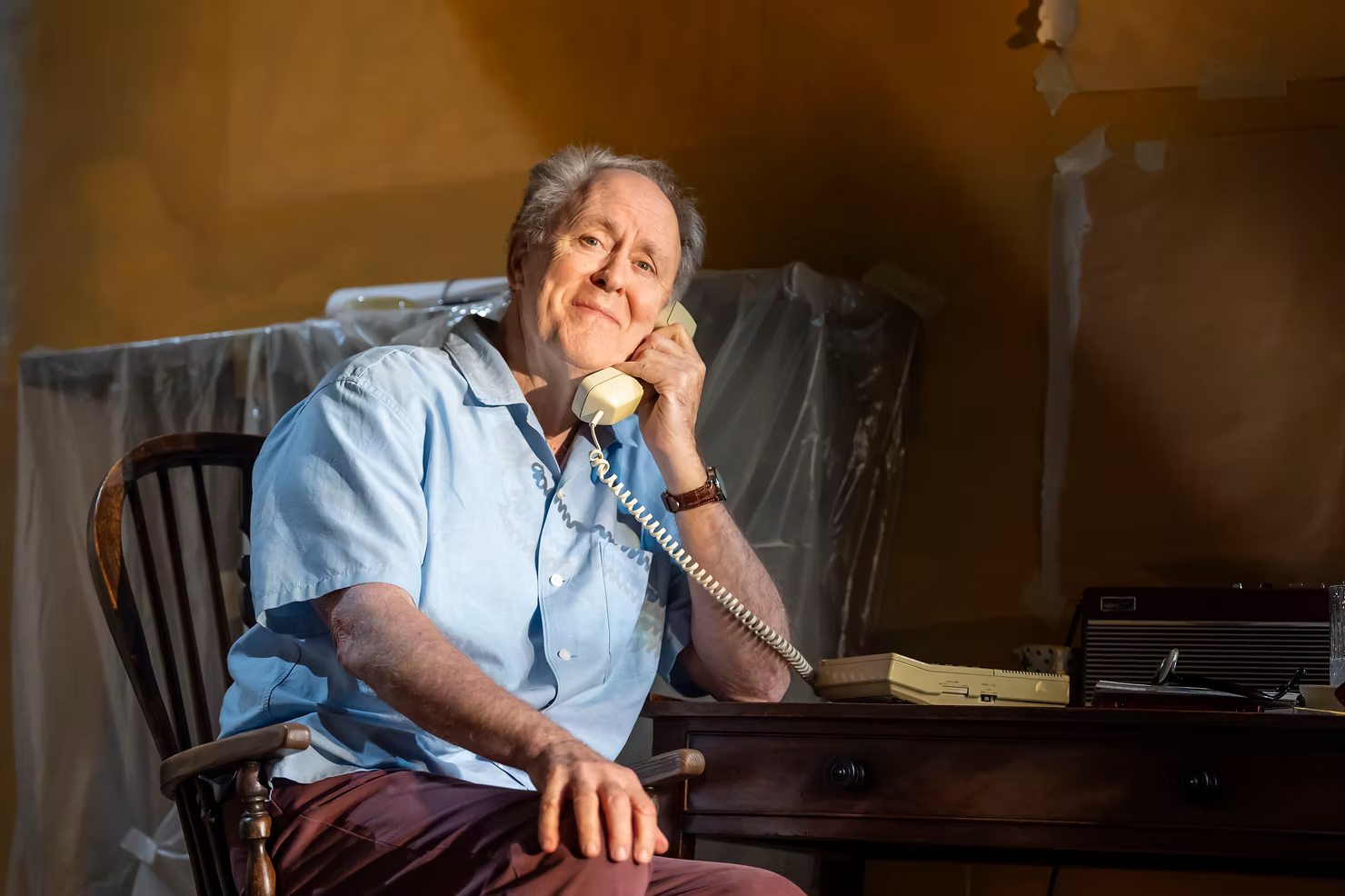Roald Dahl created some of literature’s most fantastical giants and witches, but in the new West End drama Giant, the beloved storyteller himself becomes the focal point of a monstrous moral tale.
This Olivier Award-winning play is directed by Nicholas Hytner and marks the playwriting debut of Mark Rosenblatt. Giant dramatises a scandalous episode from 1983 when Dahl penned an incendiary article about Israel that drew accusations of antisemitism. With Broadway and Hollywood veteran John Lithgow starring as Dahl, the show arrives on the West End trailing critical acclaim from its earlier run at the Royal Court.
The stage is set as a cosy English country-house kitchen, all rustic furniture and half-unpacked boxes, but don’t be fooled by the genteel trappings.

The play’s premise is simple. Roald Dahl has written a public screed condemning Israel’s actions in Lebanon, and it’s threatening to tarnish his reputation and book sales. We watch as two publishing executives descend on Dahl’s Buckinghamshire home, determined to contain the fallout. British editor Tom Maschler (Elliot Levey) and American publishing rep Jessie Stone (Aya Cash) come with a mission: to get their famous author to soften or retract his statements before The Witches hits the shelves.
At first, Dahl greets his guests with gruff, curmudgeonly charm. He complains about the noise of home renovations and cracks a few dry jokes, giving the atmosphere of a witty, civilised drawing-room comedy. But the politeness quickly thins. When Dahl pointedly asks Jessie, “You’re Jewish, aren’t you?”, it’s as if a match has been lit. What begins as a polite PR visit swiftly transforms into a fiery debate over antisemitism, free speech and the Israeli Palestinian conflict.
Giant doesn’t spoon-feed you answers or pick a side. It thrusts you into the thorny grey areas. One moment you catch yourself laughing at Dahl’s acerbic wit, and the next you recoil as he crosses the line from legitimate political criticism into outright bigotry. By the midpoint of the play, civility has collapsed, voices are raised, personal accusations fly, and decades of historical trauma are dragged into the light. Crucially, the drama remains personal: Jessie’s pride and pain as a Jewish professional who admired Dahl’s books, Tom’s conflicted loyalty as both Dahl’s friend and a Holocaust survivor’s son, and Dahl’s own stubborn self-image as a truth-teller under siege.

John Lithgow is superb as Dahl, capturing the author’s larger-than-life charm and the ferocity of his prejudices. He shifts from genial storyteller to raging bigot in a heartbeat, yet never slips into caricature. Even at Dahl’s ugliest, Lithgow reveals slivers of vulnerability that remind us this giant is still human.
Opposite him, Aya Cash as Jessie Stone matches Lithgow’s intensity beat for beat. Her character begins carefully, projecting professional calm, but you can sense the tension coiling under her polite smiles. When Jessie finally snaps, unleashing decades of collective anger and disappointment, Cash’s performance is explosive and cathartic. She becomes the voice of everyone who once adored Dahl’s imagination and now feels betrayed by his intolerance. Elliot Levey provides a superb foil as Tom Maschler, balancing humour and pathos. He often diffuses the early tension with gentle irony, at one point delivering a hilariously dry retort when Dahl probes about his Jewish background, but as the conflict escalates, Levey’s understated anguish surfaces. Rachael Stirling adds nuance as Dahl’s wife-to-be, Liccy, offering brief moments of tenderness and moral clarity amid the chaos.
Unflinching and engrossing, Giant is not a comfortable night at the theatre, but it is a brilliant one. In a West End often dominated by lighthearted musicals and familiar revivals, including Dahl’s own Matilda, this play stands out as a bold, grown-up confrontation with issues that matter. It leverages Roald Dahl’s larger-than-life legacy to examine how mostly ‘good’ people can harbour terrible ideas, and what we do about it when they do. The production’s greatest triumph is that it engages your heart and mind equally: you laugh, you wince, and you think.


